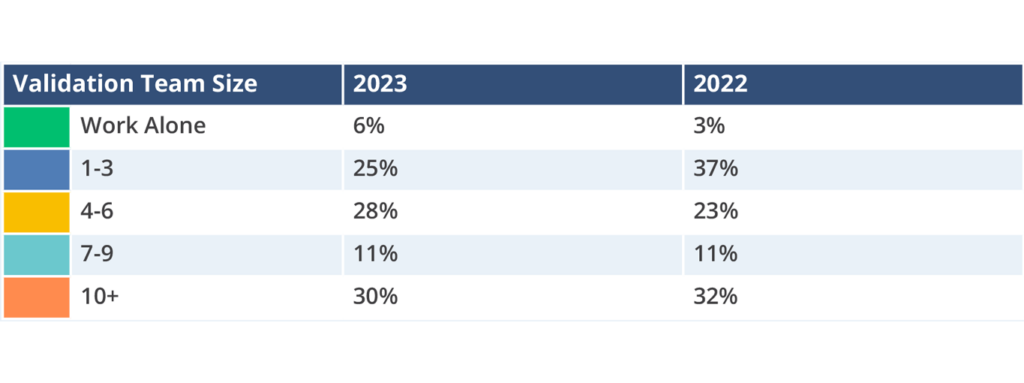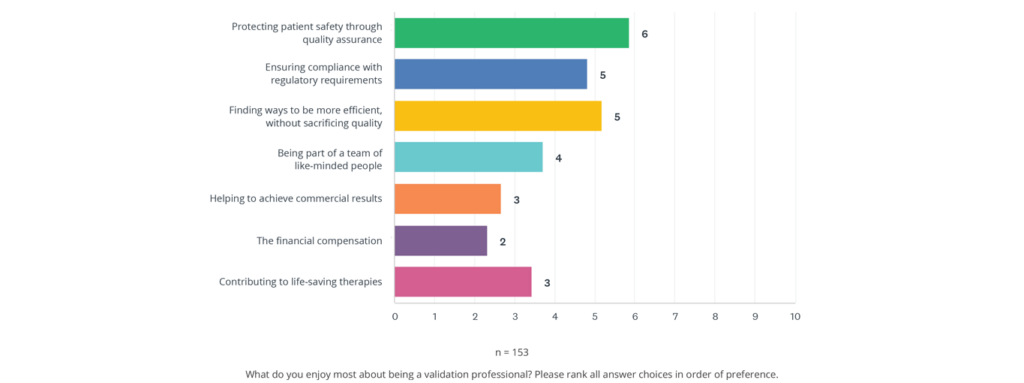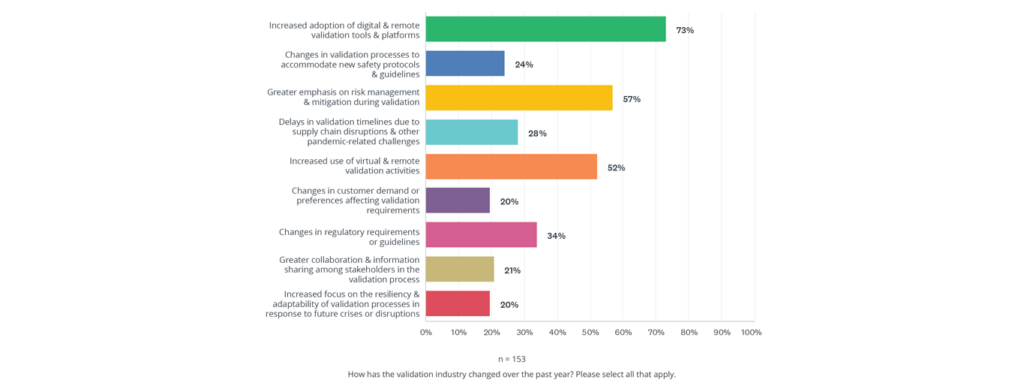In industries characterized by stringent regulations and high stakes, such as pharmaceuticals, medical devices, biotechnology, and consumer health, the importance of validation cannot be overstated. A robust validation process ensures that systems, processes, and products meet predefined standards and compliance requirements. Within these highly regulated environments, the validation team plays a pivotal role in safeguarding organizational integrity, product quality, and regulatory compliance.
In this article, we take a closer look at validation team size trends and motivations and their implications for industry today. We also outline seven reasons why you should value and love your validation team!
Validation Team Size: Trends
According to the State of Validation 2023 and 2022 surveys, most respondents (59% and 43% respectively) signaled that they operate in a team of one to six employees.

Operating with compact validation teams offers several potential benefits. Smaller teams often promote better communication, streamlined decision-making, and increased agility in responding to validation challenges. Additionally, compact teams may foster stronger collaboration and cohesion among team members, leading to increased efficiency and productivity.
While compact validation teams offer advantages, they may also face certain challenges. Limited team size may result in resource constraints, potential skill gaps, and increased workload for individual team members. Organizations need to ensure that they adequately support and equip compact validation teams with the necessary resources, training, and tools to effectively fulfill their responsibilities.
Validation Teams: Job Enjoyment
In the State of Validation 2023 survey, respondents were asked to rank the aspects of being a validation professional they enjoyed most. “Protecting Patient Safety Through Quality Assurance” gave them the most satisfaction in their daily work, followed by “Finding Ways to be More Efficient, Without Sacrificing Quality” and “Ensuring Compliance With Regulatory Requirements”. Interestingly, “Financial Compensation” was ranked last, indicating that respondents find greater satisfaction in other qualities of their job.

The focus on protecting patient safety, finding efficiency, and ensuring compliance reflects the dedication and intrinsic motivation of these professionals. Recognizing and fostering these aspects can contribute to a more fulfilling and engaged workforce. While financial compensation is still important, the findings indicate that validation professionals derive greater satisfaction from the meaningful impact they make in their daily work.
Validation leaders should ensure these aspects are measured and managed both to ensure success and strengthen retention. Organizations should consider aligning their recognition and rewards systems with the intrinsic motivations of validation professionals to enhance job satisfaction and engagement.
Download the State of Validation report 2023 to get a complete review of the survey findings with insights, analysis, year-over-year trends, and implications for industry.
Love Your Validation Team
Failure to adhere to validation requirements in regulated industries can have far-reaching consequences. Regulatory bodies, such as the U.S. Food and Drug Administration (FDA) or the European Medicines Agency (EMA), impose strict penalties for non-compliance, including warning letters, fines, product recalls, and even legal action. Beyond the financial implications, inadequate validation poses significant risks to public health and safety, eroding consumer trust and damaging an organization’s reputation.
Here’s seven reasons why you should love your validation team:
1. Expertise in Regulatory Compliance
A skilled validation team possesses in-depth knowledge of industry-specific regulations and standards. This expertise allows them to navigate complex regulatory landscapes, interpret guidelines accurately, and ensure all processes and products adhere to the required compliance standards.
2. Risk Mitigation
Validation teams are adept at identifying and mitigating risks associated with various processes and systems. By conducting thorough risk assessments, they can pinpoint potential vulnerabilities and implement measures to minimize the likelihood of errors or deviations, thereby enhancing the overall reliability of the organization’s operations and accelerating speed to market.
3. Efficient Validation Processes
Efficiency is key in highly regulated industries where time-to-market is critical. An experienced validation team streamlines the validation process, leveraging best practices and cutting-edge technologies to expedite validation activities without compromising on accuracy or compliance.
4. Cross-functional Collaboration
Validation is a multidisciplinary effort that involves collaboration across different departments. A skilled validation team fosters effective communication and collaboration between stakeholders, ensuring that everyone is aligned with validation objectives and contributing to the overall success of the validation process and business.
5. Continuous Improvement
An efficient validation team doesn’t view validation as a one-time task but as an ongoing commitment to quality. By implementing continuous improvement practices, like digital validation software training, the team identifies opportunities for optimization, stays abreast of industry advancements, and evolves alongside changing regulatory landscapes.
6. Resource Optimization
Experienced validation teams understand the importance of resource optimization. By conducting risk-based assessments, they allocate resources strategically, focusing on critical areas that have the most significant impact on compliance and product quality.
7. Adaptability to Technological Advances
In industries where technology evolves rapidly, a validation team’s ability to adapt to new tools and methodologies is crucial. Skilled validation professionals stay informed about technological advancements and incorporate innovative validation plans and strategies to ensure that systems and processes remain up-to-date and compliant.

State of Validation 2023 asked respondents how the validation industry has changed over the past 12 months. The most significant change observed by 73% of respondents is the “Increased Adoption of Digital and Remote Validation Tools and Platforms.” This suggests that the industry has embraced technology-driven solutions to conduct validation processes efficiently and remotely, potentially improving collaboration and flexibility.
New technologies, like digital validation, are allowing the function to create real business value for perhaps the first time, resulting in faster speed to market, faster release to production, and greater throughput and revenue and potential for cost effectiveness or cost savings over time.
Final Thoughts
By investing in a competent validation team, organizations not only safeguard their operations against regulatory scrutiny but also foster a culture of continuous improvement, innovation, and excellence in quality assurance. As the regulatory landscape continues to evolve, the value of a proficient validation team becomes increasingly indispensable for organizations aspiring to thrive in highly regulated environments.
Share Your Voice in the State of Validation 2025
The State of Validation is an annual report, powered by Kneat, comprising primary research conducted with validation professionals worldwide. The State of Validation survey creates an annual dataset which is analyzed and published in the report together with expert, actionable insights, which track the progression of the validation industry, enabling organizations and individuals to inform their own programs and initiatives, benchmark, adapt, and grow.
We are inviting all global validation, quality, and compliance professionals, service providers, and academics who work in highly regulated industries to take part in the State of Validation 2025 online survey.
Register your interest now and contribute your voice to the resulting report!







